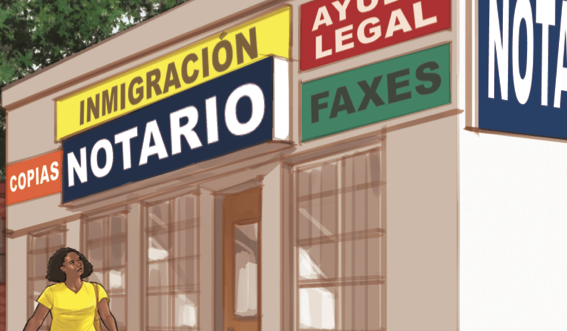FTC Releases Spanish-Language Graphic Novel Warning Consumers Of Notario Scam

The FTC’s latest fotonovela depicts Myriam and Pedro’s issues dealing with the underreported and often devastating Notario scheme.
It’s not unusual for the Federal Trade Commission to issue advisories or warnings about potentially harmful frauds, scams and schemes. Today, the agency took a more unique approach to alerting Spanish-speaking consumers to the often-underreported “notario” deception by releasing a graphic novel on the subject.
While the particularly nasty scam doesn’t make many headlines – it preys almost exclusively on recent Spanish-speaking immigrants who think they are paying for quality legal advice but instead get someone with nothing more than a notary stamp – the FTC aims to change that by offering real-life stories and practical help to stop the growing scheme through its Fotonovela campaign.
The ongoing Fotonovela effort aims to promote consumer education and protection in the Latino community. Previous topics covered with the Spanish-language graphic novels include debt collection, government impostors and income scams.
The latest edition [PDF] – titled Cómo se enteraron Myriam y Pedro de las estafas de notario – provides consumers with the warning signs of a notario scam, where to find help with the immigration process, and how to report scams to the FTC.
The scheme, which has bilked million of dollars from immigrants, takes advantage of the linguistic similarities between the Spanish phrase “notario público” – meaning a highly trained legal professional – and the English “notary public” – meaning a licensed official with witnessing duties.
The deception arises when an individual obtains a notary public license in the U.S. and uses it to misrepresent that they are a notario público to Spanish-speaking immigrants looking for legal assistance.
In general, the scheme works when a Spanish-speaking individual hires a notary under the false belief they are a qualified lawyer who can assist with things like immigration issues, or drafting wills and other legal documents.
Some notaries outright misrepresent themselves as attorneys, while others do nothing to disabuse the customer of this assumption. In some instances, the notary will say they work with a lawyer who is out of the office.
More often than not, the notario then charges an exorbitant fee for their services. However, they rarely follow through with the work.
As Consumerist previously reported, victims of the notario scam stand to lose more than just money. Some notario scam cases result in victims permanently losing opportunities to pursue immigration relief because the fraudster has damaged their case.
FTC ‘Fotonovela’ Warns Latino Community About Notario Scams [Federal Trade Commission]
Want more consumer news? Visit our parent organization, Consumer Reports, for the latest on scams, recalls, and other consumer issues.

